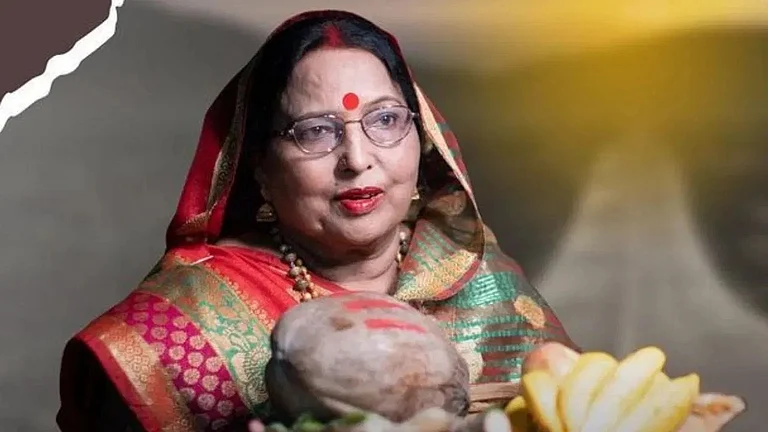The dawn of October 4 was ushered in by Bhutanese vocalist, composer and archivist Kheng Sonam Dorji and his band YakVibe at the 2025 Jodhpur RIFF. The YakVibe quartet regaled the audience with Bhutanese folk melodies as the sun rose over the magnificent Mehrangarh Fort. Dorji is skilled at playing several instruments, including the drangyen (Bhutanese lute), the esraj and the lim (Bhutanese flute). Born in the remote village of Katong in Bhutan, he learnt his first songs from his mother who passed away when he was only 11. He started performing folk songs on national radio when he was a teenager and went on to compose the first nationally broadcast song in his native dialect, Khengpa, which earned him the title ‘Kheng’ Sonam Dorji.
'Wherever I Go, I Tell People About The Yak'
Bhutanese musician Sonam Dorji spoke to Vineetha Mokkil at the Jodhpur RIFF about his efforts to preserve his homeland’s rich musical tradition.
After completing his higher studies in music at Visva Bharati University, West Bengal and Maharaja Sayajirao University of Baroda, Dorji returned to Bhutan and founded the Music of Bhutan Research Centre (MBRC), which is dedicated to the study and preservation of traditional Bhutanese music. He devotes his time to promoting, studying and archiving Bhutanese folk music, travelling to remote parts of Bhutan to interview master musicians and tradition keepers, and performing at music festival across the world. Dorji spoke to Vineetha Mokkil about his deep-rooted bond with his homeland’s music. Excerpts:
YakVibe’s performance at Jodhpur RIFF was highly appreciated by the audience. You manage to seamlessly blend traditional Bhutanese music with shades of contemporary sounds.
Music cannot be put in a cage. I think improvisation is fine. As long as we keep the authenticity of our music, we are free to add modern touches and Western instruments like guitars and drums. We want the Bhutanese youth to take up the preservation of our music. I’m glad that the Bhutanese government is making serious efforts to develop the skills of young musicians and composers, and setting aside funds to support them.
As Director of MBRC, I’ve travelled to villages scattered across Bhutan, interviewing over 230 master folk musicians. I want to make sure everything is documented. Ours is an oral tradition and there is no proper documentation. One of my reasons for setting up MBRC was to build an archive since many traditional musicians were growing old. Also, large numbers of young people were moving out of rural areas and losing their connection to their musical heritage. The archive is an invaluable resource of traditional Bhutanese music.
One of the songs that you performed at the Jodhpur RIFF was the ‘Yak Melody’, which is rooted in the bond a man shares with his faithful yak…It was a big crowd pleaser!
Wherever I go, I tell the story of the yak and I sing this song. It tugs at everyone’s heartstrings, no matter what language they speak. In the mountains where I come from, a yak is a man’s best friend. It helps you to travel across rugged paths and carries heavy loads for you. This melody is seeped in the textures of Himalayan culture. It’s a sweet, moving song, and it appeals to listeners. …Music is the only thing left in the world that has the power to bring people together. It is a universal language; a universal religion. It helps you to connect with the poor and the wealthy, with the Lamas and the Gurus.
Where does music feature on Bhutan’s Gross National Happiness Index?
Music, the arts, and craft all play a crucial role in shaping our well-being. Personally, music became a part of my life very early in life. As a little boy, I used to wander around in the forests in my village, herding cows, listening to the wind in the trees, to the roar of waterfalls. Music taught me to control the five senses, to stay centred and calm. It offers me lessons in kindness and compassion, reminds me to care for others. Music has added colour and essence to my life. Music is everything to me.
If Bhutanese folk music dies out due to lack of institutional support or dwindling interest from audiences, what impact will it have on your country?
If traditional music is lost, we lose a crucial part of our identity. Bhutanese children won’t get to know about our country’s origins, our kings, our journey to independence. Every folk song has a story behind it. There are folk songs in rare languages spoken by minorities. Different regions have their own folk music traditions; different communities have their unique melodies. Folk music is a treasure trove of stories and they are an indelible part of our history and culture. If we lose it, we will lost sight of who we have been for centuries and who we are today. Even as we navigate the currents of modernity, we must remember that our musical tradition is deeply rooted in Bhutanese identity. Folk musicians deserve more recognition and support from audiences as well as governments. Awards should be instituted to honour their contributions, and listeners should be more forthcoming in appreciating their music and their talent.


